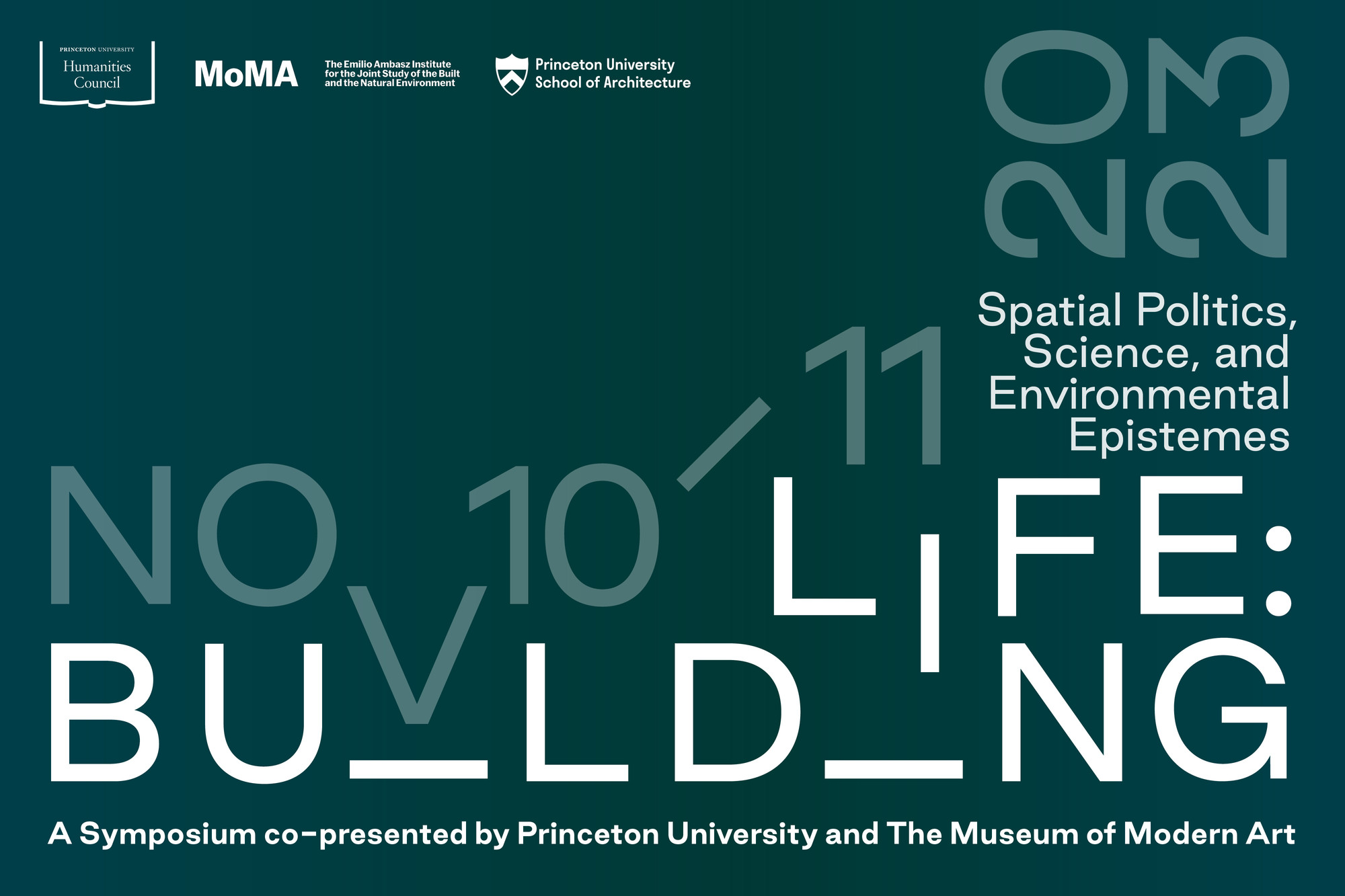A Symposium co-presented by Princeton University and The Museum of Modern Art
Dates
Friday, November 10, 2023
Princeton University School of Architecture, Betts Auditorium
Princeton, NJ
Saturday, November 11, 2023
Museum of Modern Art, Lewis B. and Dorothy Cullman Education and Research Building,
Celeste Bartos Theatre
4 West 54th Street, New York NY
Free and open to the public. Registration is required. Register now for one or both days.
Building Life: Spatial Politics, Science, and Environmental Epistemes is a two-day symposium that examines how entanglements between the interdisciplinary fields of the built environment and the sciences have transformed concepts of nature, territory, and the environment over time, reproducing global inequities that continue to (un)build life. The symposium will feature an array of scholars and practitioners whose work is reshaping our understanding of what it means to inhabit, study, and care for a climate-changed world.
Spanning the fields of art and architectural history, environmental studies, anthropology, sociology, race and ethnicity studies, Indigenous studies, colonial and postcolonial studies, and science and technology studies, among others, papers will consider how spatial and scientific practices have historically shaped human interpretations and approaches to life. They will also offer speculative projections to imagine alternative possibilities.
As a collective thought experiment, Building Life proposes that remaking socio-technological systems to repair the planet for collective human and non-human futures requires a critical rethinking of the relations between the interdisciplinary fields of the built environment and science, which serve as world-making institutions continually shaping current practices and understandings of the living.
Convened by Spyros Papapetros (Princeton University) and Esther M. Choi (the Cooper Union for the Advancement of Science and Art), Building Life is co-presented by Princeton University and the Emilio Ambasz Institute for the Joint Study of the Built and the Natural Environment at The Museum of Modern Art. This event is made possible by the generous support of a David A. Gardner ’69 Magic Grant from the Humanities Council at Princeton University.
Friday, November 10
Princeton University School of Architecture, Betts Auditorium
Doors open at 12:00 p.m.
1:00 p.m. Welcome
Mónica Ponce de Leon, Dean, Princeton University School of Architecture
1:05–1:30 Opening remarks
Spyros Papapetros (Princeton University)
Esther M. Choi (The Cooper Union)
1:30–3:50 Panel 1: Instituting Human and More-Than-Human Life
Moderated by Brooke Holmes (Princeton University)
- Hadas Steiner (University of Buffalo), “From Habitat to Environment”
- Renisa Mawani (University of British Columbia), “The Laws of the Sea and Anti-Blackness”
- Zakiyyah Iman Jackson (University of Southern California), “The Mark of the Wench”
- Alexis Pauline Gumbs, “holes in the sky: a grief architecture”
4:10–6:30 Panel 2: Contending with Landscapes and Colonial Geographies
Moderated by Rachel Price (Princeton University)
- Jay Cephas (Princeton University), “Moving Earth”
- Samia Henni (ETH Zurich), “Radioactive Ruins: France’s Nuclear Weapons Program in the Sahara”
- Sophia Roosth (New York University), “The Zebra Finch in Alice’s Restaurant”
- Hiʻilei Julia Kawehipuaakahaopulani Hobart (Yale University), “What Returns, What Remains”
Saturday, November 11
The Museum of Modern Art, 4 West 54th Street, New York, Bartos Theater
Doors open at 9:30 a.m.
10:00 a.m. Welcome
Carson Chan, Director, Ambasz Institute for the Joint Study of the Built and the Natural Environment, MoMA
10:05–10:30 Opening remarks
Spyros Papapetros (Princeton University)
Esther M. Choi (The Cooper Union)
10:30 a.m.–12:50 p.m. Panel 3: The Material Systems Of The Modern World
Moderated by Angela N. H. Creager (Princeton University)
- Mimi Sheller (Worcester Polytechnic Institute), “The Extractive Architecture of Caracol Industrial Park: Silencing Haitian Resistance to the US Occupation, Prison Camp, and Plantation”
- Irene Cheng (California College of the Arts), “The Mineral and the Corporeal: Asbestos in Maybeck’s First Church of Christ Scientist”
- Josh Lepawsky (Memorial University), “Building Indeterminacy: Forever Chemicals and the US Electronics Manufacturing Sector”
- Vincanne Adams (University of California, San Francisco), “The Swirl: On the Alterlives of Glyphosate”
2:00–4:45 Panel 4: Second Natures and Environmental Imaginaries
Moderated by Allison Carruth (Princeton University)
- Irene Small (Princeton University), “The Architecture of Interstitiality: Autopoiesis and the Organic Line”
- John Paul Ricco (University of Toronto), “To Become Extinct in the Very Practice of One’s Thinking”
- Kath Weston (University of Virginia, University of Edinburgh), “Bioengineering Financial Futures: From Synthetic Biology to Synthetic Bonds”
- Jaskiran Dhillon (The New School), “Climate Change, Environmental Epistemes, and Guideposts for World-Making into the Future”
- J. Kameron Carter (University of California, Irvine), “Reimagining Matter, or, Whiteness as an Architectural Political Theology”
4:45–5:00 Closing remarks
